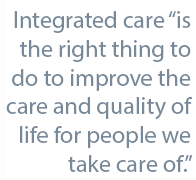Integrated Care: What Does It Mean for You?
"Integrated care" is everywhere—in theory, at least, and increasingly in practice. The concept is a feature of the delivery-system improvements in the new health care reform law, and policymakers and many clinicians have converged on the idea that general medical and behavioral health services should be brought together in a patient-centered manner. Today, a small but dedicated and growing cadre of psychiatrists is advancing the cause of integrated care and the participation of psychiatrists in collaborative-care models.

APA has established a number of initiatives in this area, headed up by the Work Group on Integrated Care of the Council on Healthcare Systems and Financing, chaired by Lori Raney, M.D., medical director of Axis Health System in Durango, Colo.; and the Board of Trustees Health Care Reform Strategic Action Work Group, chaired by Howard Goldman, M.D., director of the Network on Mental Health Policy Research (funded by the MacArthur Foundation) and editor of the APA journal Psychiatric Services. Work group members include Jürgen Unützer, M.D., who is director of the Center for Advancing Integrated Mental Health Solutions (AIMS) at the University of Washington and one of the pioneers of integration. Along with Wayne Katon, M.D., Unützer began developing models in the 1990s for integrating mental health and primary care and testing them in diverse primary care clinics around the country. Previously working on these issues was the APA Board of Trustees Work Group on Psychiatry and Healthcare Reform, chaired by Paul Summergrad, M.D., APA president-elect and chair of psychiatry at Tufts University.
Practicing in an integrated care system is a new opportunity for psychiatrists—another option on the menu of ways they can use their license to care for people—but it is not a requirement, and it may not be for everyone. Moreover, psychiatrists can work part time in an integrated care setting, while still maintaining whatever kind of traditional inpatient or outpatient practice they currently have (see question 6). There are degrees of integrated care ranging from the original model of consultation-liaison psychiatry practiced in the hospital setting; to co-located care, in which primary care and mental health services are offered in the same location; to a model—developed by Unützer and colleagues—that involves a psychiatrist working in consultation with primary care and other specialists to manage the behavioral health of a defined population of patients. The latter is sometimes referred to as “collaborative care,” and the two terms—integrated care and collaborative care—are often used interchangeably. However, for the purposes of this newsletter, the term “integrated care” will be used.
If you have a question about integrated care that you would like answered in a future newsletter, please send it to Cathy Brown, executive editor of Psychiatric News, at [email protected].
Frequently Asked Questions
To see the answers to these questions, click here. (Psychiatric News thanks Lori Raney, M.D., Paul Summergrad, M.D., and Jürgen Unützer, M.D., for their assistance in answering these questions.)
What is integrated care? | |||||
What are the predominant models of integrated care? | |||||
Why is integrated care important for psychiatrists and their patients? | |||||
How will I get paid? | |||||
What about liability for informal consultation? | |||||
Will I still be able to provide psychotherapy in a private practice setting or will I be able to work only in integrated settings? | |||||
Will I need to have an electronic medical record (EMR) system to participate? | |||||
To what extent will I be responsible for the medical care of psychiatric patients? | |||||
What new skills will I need, and where can I get trained? | |||||
Is working in integrated settings professionally rewarding? | |||||
APA Resources
Integrated Care section of APA’s website | |||||
The Institute on Psychiatric Services, which is being held in Philadelphia from October 10 to 13, is offering a special track on integrated care. For more information, click here. | |||||
Weekly newsletter on integrated care policy: Sign up by sending an e-mail to Karen Sanders, director of integrated care and delivery systems initiatives, in APA’s Office of Healthcare Systems and Financing, at [email protected]. | |||||
Coming soon! APA is now in the planning stages of webinars and other training materials for psychiatrists interested in working in integrated care settings. More information will appear in Psychiatric News as it becomes available. | |||||
APA Resources
Psychiatric Services

Psychiatric Services has introduced a new column, “Integrated Care: Integrating General Medical and Behavioral Health Care,” edited by Benjamin G. Druss, M.D. Contributions will answer key questions: What are the active ingredients in integrated models? What are the roles of different providers? And how well do various approaches work? The inaugural column, published in the August issue, describes consumer-led wellness programs for people with serious mental illness. The second installment, in the September issue, describes recent initiatives by the New York State Office of Mental Health to enhance integration of general medical and behavioral health care. The November column will examine the central role of the psychiatrist on integrated care teams.
>>Fitness Mentors Boost Exercise Participation: The ‘In SHAPE’ Program”Taking a “whole-health” approach to treating people with serious mental illness is a central tenet of integrated care. Weight-loss interventions for this population have proved disappointing. In SHAPE, an intervention that provided participants with a health mentor along with a fitness club membership, showed promising results.
>>Integrating Primary Care Into Behavioral Health Settings: What Gets in the Way?In 2009 and 2010, 56 community behavioral health agencies received SAMHSA grants (up to $500,000 a year for four years) to integrate primary care into services for adults with serious mental illness. When researchers later asked program staff to describe barriers, they heard about difficulties hiring and retaining staff and issues with use of electronic medical records and data management. For a variety of reasons, difficulty recruiting consumers to participate was the most salient barrier at one year.
>>Integrated Care: A Golden Opportunity for Preventive PsychiatryThe Affordable Care Act (ACA) includes provisions to shift the health care system to address achieving wellness rather than just treating illness. The ACA focuses attention on two major areas: greater reliance on integrated care and a renewed commitment to prevention. In this Open Forum, members of the Group for the Advancement of Psychiatry Prevention Committee describe the role that psychiatrists can play in promoting the prevention of mental illnesses.
Psychiatric News

>>Collaborative Care Well Suited to New Medicaid Health Home OptionImplementation of collaborative care for the 20 percent of Medicaid beneficiaries with depression could save the program approximately $15 billion a year.
>>Pioneer in Team-Based Care Explains How Psychiatrists Can Get InvolvedFor psychiatrists who can remember having considered going into primary care medicine, newly evolving models of integrated and collaborative care can be a way to scratch that itch. Wayne Katon, M.D.’s, career illustrates an evolution from consultative to integrated to truly “collaborative care” and that psychiatrists may find multiple ways to participate.
>>Psychiatrist Involved in Collaborative Care Before Concept ExistedCollaborative care can be “a part of what you do, or it can be all of what you do,” says Lori Raney, M.D., chair of APA’s Work Group on Integrated Care. “For most of us, it is part of what we do.” Many years ago, while working on a Navajo Indian reservation in Kayenta, Ariz., as a staff psychiatrist for the Indian Health Service (IHS), Raney discovered a knack for working as a team member with primary care physicians.
>>HIV/AIDS Care Ahead of Curve in Integrating TreatmentThe urgency of the HIV epidemic as a public-health threat helped to spur the integration of services in HIV/AIDS care in a way that has served as a prototype for the new model of care.
Other Articles:
>>Psychiatrists Can Shape Their Role in Integrated-Care Systems>>Psychiatrists Add Value to Integrated-Care Models>>Integrated-Care Movement Rapidly Gaining Momentum
American Journal of Psychiatry

>>Who Better to Deliver Collaborative Care?Using telemedicine technologies, off-site mental health specialists collaborating with on-site primary care physicians yielded better depression outcomes than practice-based care with staff available on-site.
>>Collaborative Chronic Care Models for Mental Health Conditions Across Health Care SettingsAnalyses from 57 trials showed that chronic care models, relative to comparison models, provide a robust clinical and policy framework for care integration across populations, settings, and outcome domains, achieving effects at little or no net increase in treatment costs.
>>Suicidal Behavior and Severe Neuropsychiatric Disorders Following Glucocorticoid Therapy in Primary CarePatients treated with glucocorticoids have a higher risk of suicidal behavior and developing depression, mania, or delirium/confusion/disorientation compared with those with the same underlying illness unexposed to glucocorticoids, warranting early monitoring by primary care physicians for neuropsychiatric adverse events among those taking these drugs.
Books From American Psychiatric Publishing Scheduled for Publication in 2014
Lori Raney, M.D.: The Psychiatrist's Guide to Integrated Care: Working at the Interface of Primary and Behavioral Healthcare | |||||
Robert McCarron, D.O. , Glen Xiong, M.D., Craig Keenan, M.D., and Henry Nasrallah, M.D.: Preventive Medicine in Psychiatry: A Practical Guide for Mental Health Providers | |||||
Other Resources
Academy of Psychosomatic MedicineThe Academy of Psychosomatic Medicine annual meeting, which is being held November 12 to 17 in Tucson, Ariz., will feature a number of sessions on integrated care. The academy also offers information demonstrating the importance of including psychosomatic medicine physicians in health reform efforts.
SAMHSA-HRSA Center for Integrated Health SolutionsThe SAMHSA-HRSA Center for Integrated Health Solutions (CIHS) promotes the development of integrated primary and behavioral health services to better address the needs of individuals with mental illness, including substance use disorders, whether seen in specialty behavioral health or primary care provider settings. CIHS is funded jointly by the Substance Abuse and Mental Health Services Administration (SAMHSA) and the Health Resources and Services Administration (HRSA), and it is run by the National Council for Behavioral Health. Sign up for its monthly e-newsletter here.
AIMS Center of the University of Washington: Advancing Integrated Mental Health SolutionsThe University of Washington has been one of the leaders in the evolution of integrated care. Its AIMS Center provides training, tools, technical assistance, implementation support, and psychiatric consultation to hundreds of organizations implementing evidence-based behavioral health care programs.
TEAMcare ProgramThe TEAMcare program was developed by a unique collaboration between the University of Washington and the Group Health Research Institute. TEAMcare has posted key tools that were developed for this program and are available for use by others in the implementation and practice of their own TEAMcare system.
Agency for Healthcare Research and Quality, Department of Health and Human ServicesThis government agency has been very active in the area of integrated care. Among the resources available on its site are featured innovations, which describe three programs that developed integrated primary care services to address the needs of vulnerable patient populations; and featured quality tools, which describe modules and toolkits on how to develop integrated primary care services. Two valuable references developed by the AHRQ are the Lexicon for Behavioral Health and Primary Care Integration, which provides common language and concepts related to integrated care to promote effective communication; and Atlas of Integrated Behavioral Health Care Quality Measures, which was developed for practices and teams that want to determine if they are providing high-quality integrated behavioral health care or are preparing to implement integrated care. Individuals in clinical, administrative, accounting, policy, or patient advocacy roles may each find concepts and measures of interest.
American Medical Association: Next Generation Physician Payment and Delivery ModelsThe AMA is developing resources for physicians interested in payment and delivery reforms to achieve physician-led patient-centered care, improved physician satisfaction, better coordination between specialists and primary care, and better margins. ■



